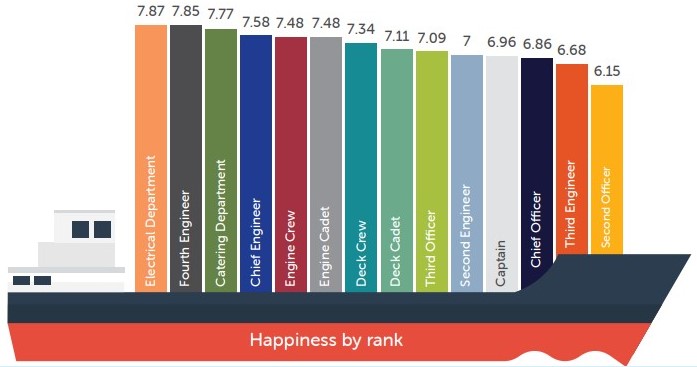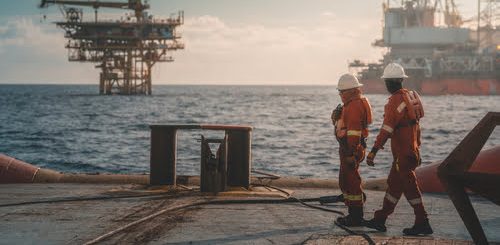The latest Seafarers Happiness Index report, published by The Mission to Seafarers, reveals that seafarer happiness levels are recovering, after reaching a record low last quarter. Overall happiness has increased from 5.85 to 7.21/10, with levels rising across all categories.
The survey, undertaken with the support of the Standard Club and Idwal, reports on Q2 2022 and shows that the influx of industry solutions to tackle seafarer wellbeing has finally begun to lift morale and the mindset onboard.
With more vaccinations, more frequent crew changes, wage rises and new amendments to the Maritime Labour Convention (MLC), there has been a knock-on effect for seafarer optimism. However, while the data does suggest improvements, now is not the time for complacency.
An easing of the COVID-19 crisis
After more than two years of uncertainty caused by COVID-19, seafarers are beginning to see the light at the end of the tunnel. While it’s still not clear if we are post-pandemic or simply experiencing a COVID lull, restrictions have now eased across the globe. Seafarers are able to move more freely and have more certainty about whether they can go ashore and when they will next be able to go home.
This freedom of movement has had a hugely beneficial effect on seafarer happiness and as vaccination levels also rise among crews, there is a sense of stability returning to the industry.
More regular crew changes and time ashore
The survey highlighted that seafarers are happier with their shore leave and with welfare facilities when they are ashore. Now that COVID restrictions are easing, more Seafarer Centres are open and able to support seafarers with the provisions they need when ashore.
The data from Q2 reflects that the industry is getting better at making crew changes more regularly, with 41% of seafarers onboard for between just 1 and 3 months.

Renewed focus on seafarer wellbeing
There has been a marked increase in a range of areas that contribute to overall improved seafarer wellbeing. There has been a focus on social events that boost morale – including weekly gatherings, quizzes, karaoke, sports, barbecues and movie nights, with increased backing and the support of leadership.
There was also a jump in seafarer satisfaction with food on board. Changes to the MLC regarding connectivity have been met with cautious optimism by seafarers who are excited at the prospect of improved communication with loved ones, yet wary of the implications of cost and quality of service. The survey shows that efforts are being made to improve seafarers’ quality of life while on board and that this focus is paying off.
This latest data shows there are signs of better things ahead for seafarers. However, any recovery in seafarer happiness should be treated delicately and can easily be lost. It is important that the industry continues the work to improve crew wellbeing and does not rest on its laurels.
Our data does show there is still a way to go and there is further work to be done to reach those seafarers who are struggling, who feel lost, frustrated and are in need of help
said The Mission to Seafarers.
Moreover, Thom Herbert, Idwal Crew Welfare Advocate and Senior Marine Surveyor added that “communication with home remains a major challenge, and although it’s good to hear that there is seafarer positivity around the MLC changes, the reality is likely to be disappointing.”
How happy about contact with family when at sea? 7.44 ↑ from 6.39
The issue of connectivity and contact with families and loved ones at home was the topic of much debate within our most recent responses. As such this debate
continues to shape the happiness of seafarers massively. There were responses warily welcoming the changes to MLC which will make access mandatory. However, the enthusiasm was tempered with concerns about cost and quality.

How happy about access to shore leave? 4.8 ↑ from 4.14
While the data for shoreleave did indeed show a modest increase, the fact that it is still so comparatively low does indeed reflect the sorry state of affairs as seafarers see things.
Yes, there is a modest degree of change. Some seafarers said they felt access to shore leave was “more likely now” – though whether they decided to bother going ashore or not was a rather different discussion. “I can go, but I feel too tired and it costs too much”, said one respondent.
How happy about wages/salary? 7.49 ↑ from 5.59
Perhaps this is reflective of the wider positive mood. When everything else feels ok, then maybe the issue of wages feels ok too. If you are feeling good, you can go home, go ashore and enjoy life a little more; suddenly the pressure and negative view of wages take on a different perspective.
How happy with your workload? 7.4 ↑ from 5.92
The positive responses said that a range of new systems and means of accessing and recording data had begun to ease the burden. There were also reviews of issues such as hygiene, and so requirements for the likes of repeated washing of working clothes were also being removed or better managed. Some vessels had even placed more catering department staff on board to assist and support the hygiene rules and requirements they were demanding.
































































